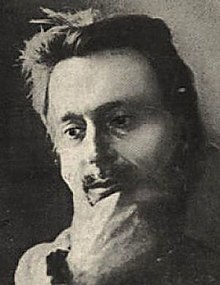Lev Chernyi
| Lev Chernyi Лев Чёрный |
|
|---|---|
 |
|
| Born |
Pavel Dimitrievich Turchaninov Birth date unknown |
| Died | September 21, 1921 |
| Nationality | Russian |
| Occupation | Poet, activist |
| Known for | Revolutionary anarchism |
Lev Chernyi (Russian: Лев Чёрный; IPA: [ˈlʲɛf ˈtɕɵrnɨj]; died September 21, 1921) was a Russian individualist anarchist theorist, activist and poet, and a leading figure of the Third Russian Revolution. In 1917, Chernyi was released from his political imprisonment by the Imperial Russian regime, and swiftly became one of the leading figures in Russian anarchism. After strongly denouncing the new Bolshevik government in various anarchist publications and joining several underground resistance movements, Chernyi was arrested by the Cheka on a charge of counterfeiting and in 1921 was executed without trial.
Chernyi was born Pavel Dimitrievich Turchaninov (Russian: Па́вел Дми́триевич Турчани́нов; IPA: [ˈpavʲɪl ˈdmʲitrʲɪjɪvʲɪt͡ɕ tʊrt͡ɕɐˈnʲinəf]) to an army colonel father. A "déclassé intellectual" whom anarchist historian Paul Avrich compares with Volin, Chernyi advocated a Nietzschean overthrow of the values of bourgeois Russian society, and rejected the voluntary communes of anarcho-communist Peter Kropotkin as a threat to the freedom of the individual. Chernyi advocated the "free association of independent individuals" in a book titled Associational Anarchism and published in 1907. Scholars including Avrich and Allan Antliff have interpreted this vision of society to have been greatly influenced by the individualist anarchists Max Stirner, and Benjamin Tucker. Subsequent to the book's publication, Chernyi was imprisoned in Siberia under the Russian Czarist regime for his revolutionary activities.
...
Wikipedia
